
|
|
Issue Number 19 • Tuesday, June 27, 2023 |
Campus ChampionGreg Diller ’07 is ready for Orientation, which kicks off this week with an overnight opportunity for the first time since 2019. “Each Orientation is a completely different and wonderful experience,” said Greg, coordinator of transition programs. Advisement and Transition is ready for its biggest annual event after busy weeks of Orientation Assistant training and returning to renovated offices in Memorial Library. Greg has helped lead four Orientations and he serves as a trusted resource for transfer students, who make up over 30% of incoming Red Dragons. Active with the New York State Transfer and Articulation Association, he is the organization’s immediate past president after serving a three-year term. Thursday, June 29 and Friday, June 30First-Year Orientation Session 2: Campus-wide event, 10 a.m. day one to 2 p.m. on day two. Thursday, July 6 and Friday, July 7First-Year Orientation Session 3: Campus-wide event, 10 a.m. day one to 2 p.m. on day two. Monday, July 10 and Tuesday, July 11First-Year Orientation Session 4: Campus-wide event, 10 a.m. day one to 2 p.m. on day two. Wednesday, July 12Transfer Orientation Session 3: Campus-wide event, 8:30 a.m. to 5 p.m. Thursday, July 13, to Sunday, July 16Alumni Reunion: Register for Alumni Reunion 2023, open to all class years and their fellow Red Dragons. View the full schedule of events. Thursday, July 13 and Friday, July 14First-Year Orientation Session 5: Campus-wide event, 10 a.m. day one to 2 p.m. on day two. Monday, July 17 and Tuesday, July 18First-Year Orientation Session 6: Campus-wide event, 10 a.m. day one to 2 p.m. on day two. |
SUNY Cortland joins effort to restore native Lake Ontario fish06/23/2023SUNY Cortland and SUNY Oswego faculty and students are collaborating with the federal Tunison Lake Ontario Biological Station in Cortland and many other agencies and organizations to save a critical piece of the Great Lakes ecosystem. This research project is made possible by a $634,546 United States Geological Services (USGS) grant, which is eligible to be extended through five years, for a potential total of more than $3 million. The initiative is part of the USGS’ Coregonine Restoration Framework, a plan endorsed in 2018 by fishery managers representing eight U.S. states, three U.S. intertribal organizations and the Canadian province of Ontario. It seeks to restore and conserve the coregonine subfamily of freshwater fish — including freshwater whitefish — found in the Great Lakes. “I'm really excited about this new partnership between the SUNY institutions and the USGS Tunison Lab.” said Li Jin, professor in SUNY Cortland’s Geology Department, and coordinator of its environmental sciences program. “Also, when we were seeking the funding opportunities, there were remarkable collaborative efforts between SUNY Oswego and Cortland, rather than competing with one another. It is exciting to see this project help set a new stage for engaging interactions among students and faculty from both Universities.” 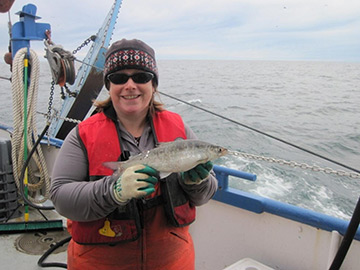
The coregonine were once harvested at commercial fisheries and still serve as part of the food chain for other commercial fish, making them vital for both a healthy ecosystem and economy. Great Lakes fisheries are worth $7 billion and support over 75,000 jobs annually, according to project leader and SUNY Oswego biological sciences faculty member Nicholas Sard. “Impediments like habitat destruction, overfishing and interactions with invasive species have drastically reduced population sizes and, in some cases, resulted in the extinction of native fish species,” Sard said. “This project seeks to restore native fish populations … by studying remediation actions to overcome these impediments.” The work of the SUNY researchers will help reveal the best ways to transport, raise and reintroduce the fish — techniques that still have little hard data in the Great Lakes Basin. Pollution, overfishing and climate change have all contributed to their decline, but the exact impact of each is still unknown. Jin and Andrea Dávalos, associate professor in SUNY Cortland’s Biological Sciences Department, are running the Cortland end of the project, while Mary Beth Voltura, associate professor in Biological Sciences, is coordinating the student interns’ participation. “We wanted to develop a program that was focused on research and internship opportunities for students, especially for identities that are usually minoritized in the sciences,” Dávalos said. Five interns were selected from a group of applicants to join the project this first year: Preston Fuerbacher, Morgan Bulger and Kayelah Brown from SUNY Cortland and Collin Atwood and Joe Sweeney from SUNY Oswego. They’ll gain experience running a hatchery and performing field and lab work. The students will be expected to produce a presentation given at a symposium hosted by SUNY Cortland this fall. "I’m most excited about learning about the various fish species located in the lakes near the Cortland campus,” said Brown, a biological sciences major. “I’m also super excited to make more connections with the new people that I meet.” Professor Patricia Conklin, chair of SUNY Cortland’s Biological Sciences, led the effort to apply for inclusion of SUNY Cortland as a University Partner in the federal Cooperative Ecosystem Studies Units (CESU). Joining the Great Lakes — Northern Forests CESU then opened the opportunity to apply for the grant funding the project. Late last year, SUNY Cortland was invited to Tunison, where a possible collaboration and the chance to have students involved in the process were discussed. SUNY Oswego will lead the main research activities, while Cortland focuses on the educational experience of the interns from both universities. Tunison is being upgraded by the USGS Great Lakes Science Center to better fit the experimental needs required to conserve and restore the coregonine. As part of the update, it’s being administratively joined with the Lake Ontario Biological Station in Oswego. The new experimental and fish-rearing potential of Tunison should align well with the in-lake experimental capabilities of the Oswego lab. “This new program involving the USGS Great Lakes Science Center, SUNY Oswego and SUNY Cortland is invaluable at several levels,” said Conklin. “For our Cortland students, it provides hands-on research experience in conservation and the chance to network with federal scientists as well as students and faculty at SUNY Owego. It will also contribute extra hands and dollars toward the restoration of coregonines, helping restore this keystone subfamily of fishes in the Great Lakes.” Another goal of the project is to increase the representation of women and racial and ethnic minorities in STEM and at fisheries. Fostering a diverse workforce is expected to help develop the next generation of fishery scientists. “One of the priorities of SUNY Cortland is to provide our students with a transformational education through experiences that go beyond the classroom, including partnerships with organizations in our region,” said Voltura. “The USGS Tunison Laboratory of Aquatic Science, with its close proximity to SUNY Cortland and active research programs, provides an excellent opportunity for our students to extend their learning through interactions with scientists working in natural resource management at the national level.” ——— From left: SUNY Oswego student Collin Atwood; SUNY Cortland students Preston Fuerbacher and Kayla Brown; Richard Chiavelli, a USGS fish culturist; SUNY Oswego student Joseph Sweeney; SUNY Cortland student Morgan Bulger; and Gregg Mackey, a USGS fish culturist, at the Tunison Lake Ontario Biological Station in Cortland. City of Cortland named best value in country for homebuyers06/27/2023The city of Cortland is a great place to visit — but would you really want to live there? A list from a website licensed by the National Association of Realtors says there’s no better place to buy a house in the United States than the neighborhoods surrounding SUNY Cortland. Realtor.com, a real estate listings website that claims more than 100 million monthly active users, placed Cortland at the top of its “10 Most Affordable Small Towns Where You’d Actually Like To Live, 2023 Edition.” To produce the ranking, the site reviewed real estate in all 543 U.S. “micropolitan areas,” which the U.S. Census defines as places of 10,000 to 50,000 people clustered around an urban core. They looked at dining, entertainment, recreation and quality-of-life businesses in the area, developing a system that incorporated that data alongside home list prices. The national list describes Cortland as a “town with lots of big-city appeal,” with proximity to larger cities like Syracuse and Ithaca as a bonus. Its natural beauty, community events, restaurants, cultural and recreational options — and a campus recently named the safest in New York state — all add to what Realtor.com points to as unmatched value. What the city and region offer has made the university an easy sell to students for years. In turn, SUNY Cortland has been a proud, longtime partner in the city’s development and success. The university is the leading employer in the city of Cortland and Cortland County, with 1,400 employees. It also acts as a valuable resource of athletic and cultural entertainment, quality childcare and volunteer service that enriches the local area that so many students, staff and faculty consider a home. “Each month, leaders from SUNY Cortland, including students, and the greater Cortland community partner on ways of helping students feel welcome and at home in Cortland,” said John Suarez, director of SUNY Cortland’s Institute for Civic Engagement. “They plan events and discuss items of mutual interest. In addition, students sharpen their skills through mutually beneficial learn-by-doing projects with people in fields such as the arts, athletics, biology, education and government.” Included among SUNY Cortland’s many efforts as part of the community are:
“The city working together with the university has been positive to providing a better quality of life to an already outstanding environment academically as well as city resources," said Cortland Mayor Scott Steve. “This partnership has been great for the academic opportunities to assist in parking studies, tree replacement data and even cleaning up projects and The Big Event.” It is this level of outreach from the university for its home region that, in 2015, made SUNY Cortland the first ever SUNY institution to gain the Carnegie Foundation’s community engagement endorsement, and has led it to be named multiple times to the U.S. President’s Higher Education Community Service Honor Roll. Capture the MomentSUNY Cortland Orientation Assistants share a laugh while practicing skits during a final dress rehearsal in Corey Union on Wednesday, June 21. They wrote the scenarios that will be performed for first-year students and their guests about college life and issues students may face when they arrive on campus. Read more about this year’s 14 Orientation Assistants. In Other NewsRich Coyne ’07 named VP for Institutional AdvancementRich Coyne ’07 spent his first year as a college student at Stony Brook University. He decided to transfer to SUNY Cortland for its smaller class sizes and better access to faculty as well as a chance to play football for the Red Dragons. Little did he know at the time that it was a decision that would shape a career in higher education. Coyne was named SUNY Cortland’s vice president for Institutional Advancement earlier this month, a role in which he will provide vision and leadership for the offices of Alumni Engagement, Communications, Development, Marketing, Foundation Financial Services, Advancement Information Services and the Cortland College Foundation. “When I’m working with donors, I want them to know that I’m committed to the university,” Coyne said. “Being a graduate is a reminder to donors that I’m a Cortland guy. I’m here for the long haul and I care about the future of the institution. That’s why I decided to stay here and continue to grow here professionally.” Coyne replaces Peter C. Perkins, who retired in June 2023 after having led Institutional Advancement since 2015. After earning a master’s degree in management from Stevens Institute of Technology in 2009, Coyne learned that Cortland was hiring a full-time general manager for the Lynne Parks ’68 SUNY Cortland Alumni House. “I saw an ad for the job and it was like it was written for me,” Coyne said. Over the past 14 years, Coyne has served in several positions in Institutional Advancement, including major gift officer and later as senior gift officer. He was promoted to associate vice president for Institutional Advancement in 2020. He was recognized with a SUNY Chancellor’s Award for Excellence in Professional Service in 2023. Coyne has served on several campus committees, including the Risk Management Assessment Team, the Campus Beautification Committee, the President’s Advisory Council and is a member of the Cortland Auxiliary Services Board. Coyne has guided several major initiatives in recent years, including planning for Cortaca Jug games at MetLife and Yankee stadiums, the largest gatherings of Cortland alumni in the university’s history and an opportunity to elevate the reputation of the institution on a mass scale. He worked to create a Student Emergency Fund, which has raised more than $400,000 to support students facing unforeseen financial hardships, as well as a Diversity, Equity and Inclusion Fund that has raised more than $90,000 to date. 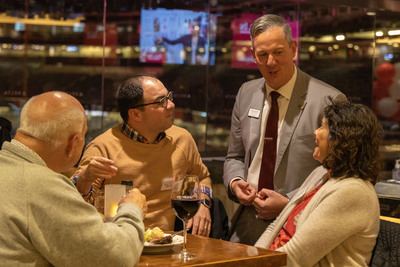
Throughout the All In: Building on Success comprehensive campaign that concluded in 2022, Coyne was a key player in helping SUNY Cortland raise more than $30 million for students and key institutional priorities. He is also passionate about supporting undergraduate research through summer fellowships and events like the Michael J. Bond ’75, M.D. Alumni/Undergraduate Science Symposium that connect students, faculty and staff. Thanks to Coyne’s work with generous donors, funding is also available for Cortland students to attend regional and national conferences that give them a chance to learn from experts and present their work to new audiences. “When people think about Cortland, they might not think about undergraduate research, but I’d love to be able to help change that tide,” Coyne said. “There are these truly special applied learning opportunities for our students within their career paths all across campus.” Coyne is also particularly proud of his past work in connecting with alumni and friends of the university to support and create scholarships that both benefit students and bring together Cortland’s graduates. A chief example is the William F. Pittorino ’85 Humanitarian Memorial Scholarship, named in honor of a former SUNY Cortland football player who passed away after a battle with cancer in 2018. The scholarship is awarded to service-minded physical education students with demonstrated financial need. Pittorino’s friends formed new bonds together after his passing and they’ve regularly come together to meet on campus or online to reminiscence and trade old stories. It’s the perfect mix of scholarship support, engagement and building of school spirit that Coyne hopes to continue in his role as vice president. “Having Cortland serve as the space that brings them back together, it’s a testament to their experience as students,” Coyne said. “For them to have this bond, rooted in relationships that were formed decades ago, is what makes Cortland so special. It is a place where they want to honor Billy’s legacy and pay it forward.” In 2017, Cortland unveiled a Red Dragon sculpture in front of the Stadium Complex. It was an event that remains one of Coyne’s proudest moments. He teamed with donor Mike Vela ’88 and artist Scott Oldfield ’06 to make the idea come to life. The sculpture has become a striking piece of public art, a marketing tool and a symbol of Red Dragon spirit. “When someone comes here as a prospective student and takes a photo in front of it and four or five years later takes another photo when they graduate, that’s really powerful to me,” Coyne said. “It’s about building a sense of school pride and community throughout your time as a student, a sculpture can help accomplish that.” In addition to leading the offices of the Division of Institutional Advancement, the vice president is tasked with enhancing the university’s image and developing and building relationships with communities including alumni, parents and benefactors. Coyne is looking forward to working with many more members of the Cortland community and encourages individuals to reach out to his office with questions and ideas for future partnerships. One of Coyne’s initial aims in his new role is to better connect and promote the work of the Cortland College Foundation Board of Directors, the Alumni Association Board of Directors and the offices of Institutional Advancement. “Across the board, from engagement, marketing and communications perspectives, it’s a responsibility that we continue to pound our chest, if you will, about the outstanding education provided by Cortland and its tremendous value in terms of affordability,” Coyne said. “You sprinkle in all of the cultural, social and athletic experiences and it’s clear that we offer the total package.” “Institutional Advancement plays a critical role in helping to attract students to Cortland, keeping alumni, parents and our campus constituents - faculty, staff and emeriti - engaged with the university, whether that’s giving back of their time or making financial contributions if they’re able.” More voices raised for Parkinson Voice ProjectFor individuals with Parkinson’s, one of the most devastating effects of the incurable neurological condition is having their voices slowly fall silent. “Initially a patient might talk very softly,” said Michele Chisholm Clukey ’14, M ’16, a speech-language pathologist who works at Guthrie Cortland Medical Center. “They are not able to project their voice. They have a hard time communicating with their friends and family.” Parkinson’s disease affects the nerve cells in the brain that produce dopamine. Symptoms include muscle rigidity, tremors and changes in speech and gait. 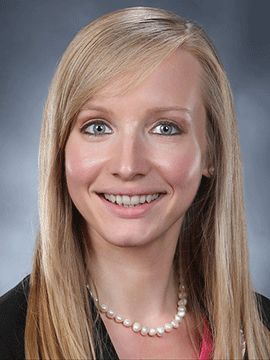 Clukey in the past three years has developed a partnership with SUNY Cortland’s Communication Disorders and Sciences Department to help individuals with Parkinson’s regain their voice volume. She closely mentors college graduate students, six to date from SUNY Cortland, and also passes along her hospital patients to her alma mater’s Center for Speech, Language and Hearing Disorders for the maintenance therapy that is not typically reimbursed by health insurers. In three weekly sessions lasting four weeks, Clukey trains individual patients to raise their voices by speaking with intention, which involves them exercising a part of their brain that is not harmed by the chronic neurological condition, one involving deliberate actions and vocalizations. Then she passes them along to SUNY Cortland graduate students working on their Master of Science in Communication Sciences and Disorders in the university’s Center for Speech, Language and Hearing Disorders for group maintenance therapy. “At the end of four weeks, their ability to project their voice, make their wants and needs known, has improved,” Clukey said. “They are no longer asked, ‘What did you say?’ all the time. They have a confidence about them that is so much more elevated than it was prior. That’s what makes the therapy exciting, it’s seeing their confidence and their personalities kind of shine out when they are done.” Both hospital and university are using the SPEAK OUT! ® therapeutic approach that SUNY Cortland introduced locally four years ago, and which has been supported annually by grants renewed by the Parkinson Voice Project (PVP), a Richardson, Texas-based 501(c)(3) non-profit. Now PVP for a fifth consecutive year has awarded SUNY Cortland’s Communication Disorders and Sciences Department one of its 2023 SPEAK OUT! ® grants, which will train an estimated 23- to 24 incoming graduate students, according to the grant’s administrator at SUNY Cortland for three years, Eileen Gilroy, externship coordinator, clinical educator and a lecturer IV in communication disorders and sciences. “This year’s grant funded the training for all incoming graduate students and two clinical faculty members, and supported the purchase of enhanced lighting for tele-practice sessions,” Gilroy said. To continue receiving the grants, SUNY Cortland faculty collaborate closely with PVP to keep everyone up to speed, Gilroy noted. Up to 90% of people with Parkinson’s are at risk of losing their ability to speak, said Samantha Elandary, PVP’s founder and chief executive officer, in announcing the latest year of grants. “In addition, swallowing complications account for 70% of the mortality rate in this patient population,” Elandary said. “Our vision at Parkinson Voice Project is to make quality speech therapy accessible to people with Parkinson’s worldwide.” PVP serves 364 clinic hospitals, universities, private practices and other speech therapy clinics across the United States and abroad with the training, workbooks and access to the PVP’s eLibrary. Cortland’s Center for Speech, Language and Hearing Disorders, operating to the public out of the Professional Studies Building on the main campus, is among only a handful of providers across New York state to offer the program and most are in large upstate urban centers or the metropolitan New York area. Services are delivered in-person at the center or via tele-practice for individuals that reside in New York state. “One thing I really like about SPEAK OUT! ® that’s different than other treatment protocols is that it includes aspects of cognitive therapy,” Clukey said. “And the general principle that we’re teaching, which is to speak with intent, you can use that in other aspects of your life. You can walk with intent. You can write with intent. So, I think it generalizes better than just a narrowed voice treatment protocol.” Gilroy said clinicians providing in-person services use a sound pressure meter, which measures the decibel level of the client’s voice, to let the patient know how successfully they are raising the volume of their voice or vocalizing with intent. “With Parkinson’s patients, their volume declines, and they tend to mumble,” Gilroy said. “We teach them to speak with purpose." “The whole idea behind this therapy stems from the fact that automatic tasks are harder for individuals with Parkinson's,” added Gilroy’s colleague, Rachel King ’15, M ’17, a lecturer and speech-language pathologist who works with the clients in the initial phase. "So this retrains their brain so they can get used to this new lifestyle and communicate more effectively." Clients who have rehabilitated their skills graduate into one time weekly SPEAK OUT! ® Groups; however, individual therapy can be extended for those who did not reach their goals, King said. “Our clients make a lot of progress in that four weeks, with the individual attention and daily working out of their voice,” Gilroy said. “Then, it’s like a gym, if you get to your goal and you don’t maintain it, you’re going to regress.” The maintenance phase of treatment is called SPEAK OUT! ® Groups, formerly LOUD Crowd. Clients practice their new skills together in a weekly tele-practice group setting. “The groups are dynamic and fun,” Gilroy said. “Members support each other, and groups have developed a sense of family.” “What’s a surprise is that individuals who were dependent on a spouse or family member to drive to get them to the clinic can logon to be independent,” she said. Graduate student clinicians work under the supervision of certified, New York-licensed clinical educators to provide individual and group SPEAK OUT!® sessions, Gilroy said. “These direct clinical experiences help the graduate students complete required clinical hours needed for future certification from the American Speech Language and Hearing Association,” she said. “If they have this on their resume, it gives them a leg up,” King said. SUNY Cortland’s growing number of referrals are accepted from hospitals, other speech and audiology clinics, physicians, physical therapists, families and other health organizations. 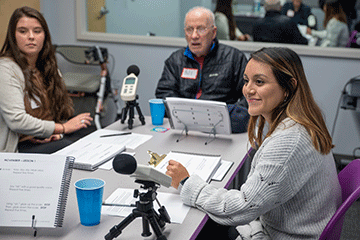 “Many clients complete individual sessions at other hospitals or clinics, and then they join our SPEAK OUT! ® Groups,” Gilroy said. This summer, Gilroy serves 16 clients weekly in SPEAK OUT! ®Groups, and two more local residents are on a waiting list to begin the therapy course in the fall. She estimates that 25 clients with Parkinson’s have been served since 2019. Students who complete the SPEAK OUT! ® training are gaining a valuable hands-on experience toward becoming fully credentialed professionals. Having the SPEAK OUT® training places the SUNY Cortland future clinicians at an advantage for Clukey’s intensive, 16-weeks of 40-hours-long externship slots with competing candidates from nearby universities. “Not only do the externship students need to be strong clinically, but they also need to be professional, they need to have respect, they need to be the ‘whole package,’” Clukey said. “The SUNY Cortland students really are the ones that seem to be the ‘whole package’ students.” Transfer support earns national recognition againMichaela Henderson ’23 encourages new transfer students at SUNY Cortland to be patient and to get involved on campus, no matter how difficult it might seem at first. She reminds them that a strong support network exists for students coming from other colleges and universities. It’s one reason why SUNY Cortland has been named for the sixth consecutive year to the Transfer Honor Roll published by Phi Theta Kappa (PTK), an international honor society that includes high-achieving students from two-year colleges. The 2023 list recognized 208 campuses nationwide, including four from the SUNY system. Cortland is New York’s only public institution to be honored every year since 2018. Roughly 2,150 transfer students applied to the university in 2022, with 731 enrolling. Henderson admits that her transition wasn’t instantly perfect when she arrived for the spring semester in 2021. She chose Cortland because of the university’s reputation in teacher education, but her arrival came during the COVID-19 pandemic. Building relationships and meeting new people was difficult, she said. 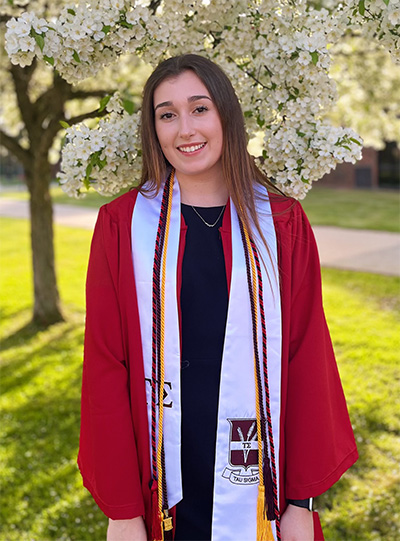 “It can be intimidating going to events by yourself,” said Henderson, a childhood/early childhood education major from Conklin, N.Y. “Once I got involved and met people, I found my place on campus and Cortland became so much more like home to me.” She credits her success to staff members in Advisement and Transition, specifically Greg Diller ’07, coordinator of transition programs, and Marinda Souva, associate director of transition programs. Advisement and Transition specializes in academic advising for all students, including transfers, and the office serves as a resource for questions about academic decision-making. “Anything I ever needed or any questions I had, (Advisement and Transition) was always readily available to meet with me and happy to help with anything,” said Henderson, who will complete her student teaching requirements in the Chenango Forks Central School District during the upcoming fall semester. “If they didn’t know, they could point me in the right direction. They were just great.” In order to be named to the PTK Honor Roll, campus representatives complete a profile using an online tool called PTK Connect. Institutions are then assigned a transfer friendliness rating based on qualities such as transfer student support services, financial aid, admissions outreach and campus opportunities. The top 25% of highest-rated campuses are recognized. Henderson also credited transfer-specific recognition in the form of the Tau Sigma Honor Society, which invites students who earn at least a 3.5 grade point average or rank among the top 20% of all transfers academically in their first semester. Henderson was inducted in Tau Sigma in 2022 and joined other student groups that included Education Club and the Transfer Network Team in her two-plus years on campus. “It just feels nice being recognized with other transfer students,” she said, encouraging future Red Dragons to attend club fairs early in the semester, read their Cortland emails and check out Transfer Network Team events, which can include anything from midterm stress relievers to an informal stuff-a-bear event. Among the tools that SUNY Cortland continues to highlight in its PTK Honor Roll application:
Prospective transfer students can contact the Admissions Office to learn about the application process or Advisement and Transition for support resources. Visit the Phi Theta Kappa website for more information on SUNY Cortland’s recent recognition, including a full list of all 2023 PTK Honor Roll members. Ice in her veins: alum finds hockey media successAs a hockey fan, Alex Russo ’22 of Staten Island, N.Y., is no stranger to late-game heroics. But it must have still been a shock when a chance at her own dream job came down to overtime. Russo, 21, a communications studies major, was hired in December by popular national sports website Bleacher Report as part its Open Ice team as a hockey expert and content programmer. By day she develops ideas and content. Night shifts place Russo in the middle of the NHL action, where she follows up to 10 games at a time and elevates the best plays to social media. “As long as you know and love the game, you know which moments are important, and that goes beyond the game itself,” Russo said. “Sometimes these moments are fan moments or moments between players or their families.” At SUNY Cortland, she was the sports editor of the Dragon Chronicle — the first woman ever to hold that position — and became the in-person media coordinator and in-person reporter for the Red Dragon men's hockey team. It helped Russo that writing is more than her career choice, it’s a joy that’s been with her since she first picked up a pen. 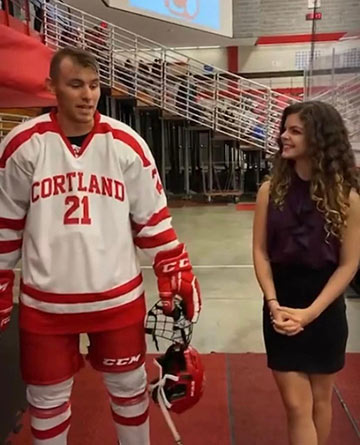
“I would write with an LED pen on the walls of my bedroom as a child and would use an LED flashlight to illuminate the words in the dark,” Russo said. “I was hopelessly in love with poetry and wrote every chance I had — not only on walls, I promise, but in notebooks, and now in notes on my phone or laptop.” Her hockey fandom goes back almost as far. At 12 years old, her dad, Frank, told her about a New York Rangers star, Martin St. Louis, whose mother had recently died. His entire team went to her funeral in the midst of a playoff series to support him. St. Louis, not expected to play after that, returned to the ice for the love of his mom and his teammates. Trailing in the series, the Rangers rallied to win. After that, Russo knew she would be a Rangers fan for life — and that her life goal was to build a career in hockey media. So, at 13, she began contributing game recaps to the Ranger Zone website. Then, at 14, she joined Blue Line Station, another Rangers fan site. Soon she was hired as a writer for Puck Pros before being let go for being too young. Not to be denied, she focused on her goal at Cortland. Russo credits the classes of Lecturer Mario Hernandez M ’03 and Adjunct Professor Elizabeth Wells, both of the English Department, for enhancing her writing and speaking skills and encouraging her to think creatively. She says that her advisors, coaches and other faculty created a college experience that she “adored.” But whatever she thought of her time at school, Russo knew she wanted to get into the media industry as fast possible. She worked four jobs during her time at the university and took 19 to 21 credits each semester before graduating last winter. 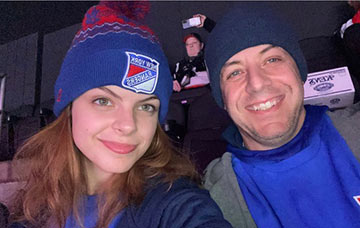
“Perhaps above all, I have to thank my advisor, Paul Van der Veur, who went above and beyond in helping me complete college in 2 1/2 years and found every opportunity for me. SUNY Cortland also gave me some of my best friends who have supported me through all my highs and lows. Attending Cortland was easily one of the best decisions I ever made.” Yet any sports fan knows there’s not always a Cinderella story at the end of a season. Despite Russo’s hard work, the new job almost didn’t happen. Matt Schneider, who works for Bleacher Report Open Ice, discovered Russo’s SUNY Cortland intermission interviews on Instagram. After talking with him, she applied and earned an interview. Russo then endured an agonizing weekslong wait. Adding to the drama, Russo had been offered full scholarships for grad school at Emerson College and the Connecticut School of Broadcasting — and her time to accept was running out. Faced with her own version of sudden death, Russo followed her heart and made the only play she could: letting the college deadline pass. An hour later the same day, riding home from Cortland after graduating, she received the call she'd waited for. There might not have been a screaming crowd or confetti from the rafters, but Russo had just won her dream job. “I’ve only been at Open Ice for five months, but my perspective on hockey has expanded, my creative abilities have flourished and I have met some incredible people who have helped me grow in my position.” She still has one more goal — to work for the Rangers and repay the man who first set her on her path. “I adore the roar of the crowd, the atmosphere, the jerseys, the history, and everything in between. My dad is my reason for everything, and I want to give back to him for everything he’s done for me by one day having a position where I have access to or can afford season tickets for him.” Alumni Reunion 2023 announcedDon’t miss out on celebrating Alumni Reunion 2023 with the more than 200 Red Dragons already registered to participate in class get-togethers, parties and other activities both on and off campus. The last day to register is Friday, June 30. Those who signed up but need to cancel their registration must also do so by this date in order to receive a refund. 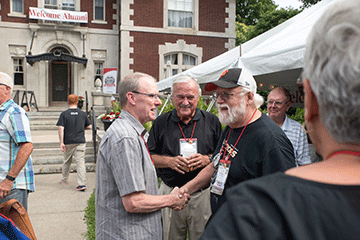 The Reunion runs from Thursday, July 13, to Sunday, July 16. Everyone from all class years is welcome to attend and join their classmates for a long weekend filled with fun and exciting events and activities. Milestone and featured groups:
Be sure to check out our full schedule of events, including schedules for use of campus recreational facilities. Lodging accommodations at area hotels and on campus are available. On-campus lodging can be purchased through the registration form. 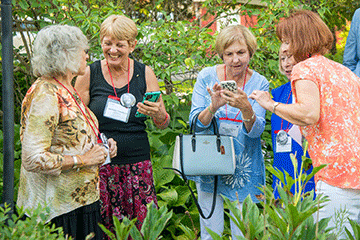 Want to showcase your business or celebrate you and your friends’ return to Cortland? Then consider purchasing one of our Sponsorship Packages to support the weekend and our annual Red and White Golf Classic. Also, consider supporting SUNY Cortland, our students and the Reunion Giving Challenge by making a gift to the university when you register. Additional information regarding the weekend — including parking, shuttles, attire and more — can be found here. If you have any additional questions, please contact Alumni Engagement at 607-753-2516. C4 holds third Juneteenth CelebrationLocal Cortland residents gathered downtown in Courthouse Park on Saturday, June 17, to celebrate Juneteenth, a holiday that officially recognizes Black American emancipation. Cortland County’s third annual Juneteenth Celebration, marking the end of slavery in America, was again hosted by the Cortland County Community of Color (C4) network — a collaborative initiative between SUNY Cortland and Tompkins Cortland Community College. Although most area college students are gone, many current and former faculty, staff and community members of diverse backgrounds and all ages gathered and enjoyed the festivities. Photo galleries of the festivities can be viewed on SUNY Cortland Facebook and Google share. 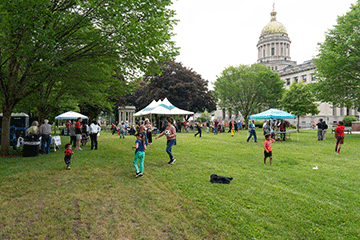 Tracy McPherson Hudson ’89, M ’93, Ed.D., an assistant professor of physical education who joined SUNY Cortland in 2021 as a SUNY Diversity Fellow, delivered the keynote speech. Offering remarks were the presidents of both SUNY Cortland and TC3 — Erik J. Bitterbaum and Amy Kremenek, respectively — and Cortland City Mayor Scott Steve and New York State Senator Lea Webb of the 52nd District representing Broome, Cortland and Tompkins counties. Juneteenth, the day of freedom for once enslaved African Americans, is celebrated on the 19th of June instead of Sept. 22, the calendar day when President Abraham Lincoln issued the Emancipation Proclamation in 1863. The reason is because June 19, 1865 — two years later — was the day the Union Army marched into Galveston, Texas, and enforced the late President Lincoln’s emancipation in the state. 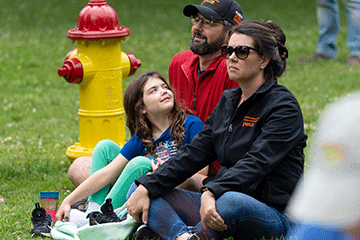 “Juneteenth became a national holiday in 2021, but Black Americans have celebrated Juneteenth from day one,” said Lorraine Lopez-Janove, SUNY Cortland’s chief diversity and inclusion officer. “C4 made the decision to open it up and bring awareness of Juneteenth to the Cortland community, explain why we celebrate it, and have lots of fun in the process.” The Cortland Community Foundation also sponsored this year’s event. Organizers thanked the City of Cortland and the Cortland Police Department for their continued support for this event. Colleen Ames named women's basketball head coachColleen Ames has been named the women's basketball head coach at SUNY Cortland, according to director of athletics Mike Urtz. Ames replaces Jacey Brooks, who accepted the position as women's basketball associate head coach at Division I University at Buffalo after five years at Cortland. "I want to thank Athletics Director Mike Urtz and the entire SUNY Cortland athletics staff for giving me this opportunity," said Ames. "I’m very excited to be back in the SUNYAC and compete in one of the best conferences in the region. "The women’s basketball program at Cortland has a standard of success and I plan to uphold that legacy. The resources and support staff this institution has to offer will allow me to help develop our student-athletes into the best possible versions of themselves both on and off the court." Ames has coached the past four seasons at Mount Saint Mary College in Newburgh, N.Y., where she guided the Knights to a combined record of 63-16 (.797), including a 52-6 mark (.897) during Skyline Conference regular-season games. The Skyline Conference Coach of the Year during the 2021-22 season, Ames guided her squad that season to a 24-4 record, the conference tournament and regular-season titles, and the second round of the NCAA Division III playoffs after a first-round win at Johns Hopkins. She also led the Knights to a 20-6 record and the Skyline regular-season title during the 2019-20 season and a 19-6 record in 2022-23 (the 2020-21 season was canceled). Prior to her time at Mount Saint Mary, Ames served as interim head coach at Clarkson University during the 2018-19 season and as an assistant coach in 2017-18. She also was a volunteer assistant coach at SUNY New Paltz in 2016-17, helping the Hawks post a 20-9 record, win the SUNYAC title and advance to the NCAA Division III "sweet 16" with wins over Bowdoin and Ithaca. In addition, Ames served as an assistant coach for the Long Island Lightning AAU organization for five years prior to her collegiate coaching experience. Ames is a 2017 graduate of New Paltz, where she earned a bachelor's degree in sociology, and she earned a master's degree in business administration from Clarkson. Ames played two seasons at New Paltz from 2014-16, finishing with totals of 407 points, 82 made 3-pointes, 177 rebounds, 45 assists and 45 steals. As a senior during the 2015-16 season she played in 28 games, 20 as a starter, and helped the Hawks win the SUNYAC title. Prior to New Paltz, Ames played two seasons at Division II St. Thomas Aquinas College. "Colleen is familiar with our conference, which helps her to hit the ground running in terms of what we need and how we need to play," said Urtz. "Her success at Mount Saint Mary shows us that she can be a really good fit for Cortland. We are excited to see her grow here professionally as well as keep us competitive, all while maintaining a great experience for our student athletes." A native of Lindenhurst, N.Y., Ames is a 2012 alumna of Lindenhurst High School. She competed in basketball and volleyball for the Bulldogs and earned basketball all-state honors during her senior season. Career Services recognized with SUNYCDO Excellence in Diversity, Equity and Inclusion Initiatives AwardSUNY Cortland’s Career Services Office received the SUNY Career Development Organization (SUNYCDO) Office Award for Excellence in Diversity, Equity, and Inclusion Initiatives at the annual SUNYCDO Conference on June 15 in Albany, N.Y. This award recognizes one SUNY campus for moving the field of career development forward with regard to increased diversity, equity, inclusion and belonging (DEIB). Through the efforts of several staff members during the past academic year, SUNY Cortland Career Services promoted individual and group student success through identity-focused programming on campus. Career Services supports the career needs of all students and works to enhance career prospects for students from underrepresented groups. Additionally, Career Services staff members serve on committees on campus including the Anti-Racism Task Force and Sexual Orientation, Gender Identity and Expression (SOGIE). Professionals from SUNY Cortland led the SUNYCDO DEI Committee, which offered professional development for career professionals across New York state.
Communications Office staff receive SUNYCUAD Awards for ExcellenceSUNY Cortland's Communications Office staff members received four awards at the SUNY Council for University Advancement (SUNYCUAD) Awards for Excellence, presented during the 2023 conference held June 7 to 9 in Syracuse, N.Y.:
 Suggest a feature story Suggest a feature story
Faculty/Staff ActivitiesPeter M. McGinnisPeter M. McGinnis, Distinguished Service Professor of Kinesiology, had the 4th edition of his textbook, Biomechanics of Sport and Exercise, translated to Japanese. The book was published by Medical Sciences International, Ltd. in Tokyo. Counting this translation and those of previous editions, the book has now been translated into six different languages. Susan RaylSusan Rayl, Kinesiology Department, received the “Sue and Ron Smith Service Award” at the annual convention of the North American Society for Sport History (NASSH) held May 26 to 29 in Washington, D.C. The award recognizes exceptional contributions to the organization. Rayl has served as the convention photographer since 2013. Mary Schlarb and Jena CurtisMary Schlarb, Division of Academic Affairs, and Jena Curtis, Health Department, presented at the NAFSA: Association of International Educators conference held May 29 to June 2 in Washington, D.C. Their session on May 31, “LGBTQ+ Abroad: Research on Student Experiences and Promising Practices” had more than 140 attendees. Jacob WrightJacob Wright, Career Services, received the Central New York Career Development Association (CNYCDA) Student Success Champion Award at the CNYCDA annual meeting on June 2 in Dundee, N.Y. Wright is a career coach and educator. The award recognizes one professional in a 10-campus consortium for moving the industry of career development forward and promoting individual and group student success through student-centered programming.  Submit your faculty/staff activity Submit your faculty/staff activity
In MemoriamDaniel J. Brennan, former chair of the Geology Department, died on Monday, June 5, 2023. Bess Koval, professor emerita of physical education, died on Thursday, May 25, 2023. Kenneth P. Wickman, associate professor emeritus of economics, died on Saturday, June 3, 2023. |
The Bulletin is produced by the Communications Office at SUNY Cortland and is published every other Tuesday during the academic year. Read more about The Bulletin. To submit items, email your information to [email protected]
© 2026 SUNY Cortland. all rights reserved.